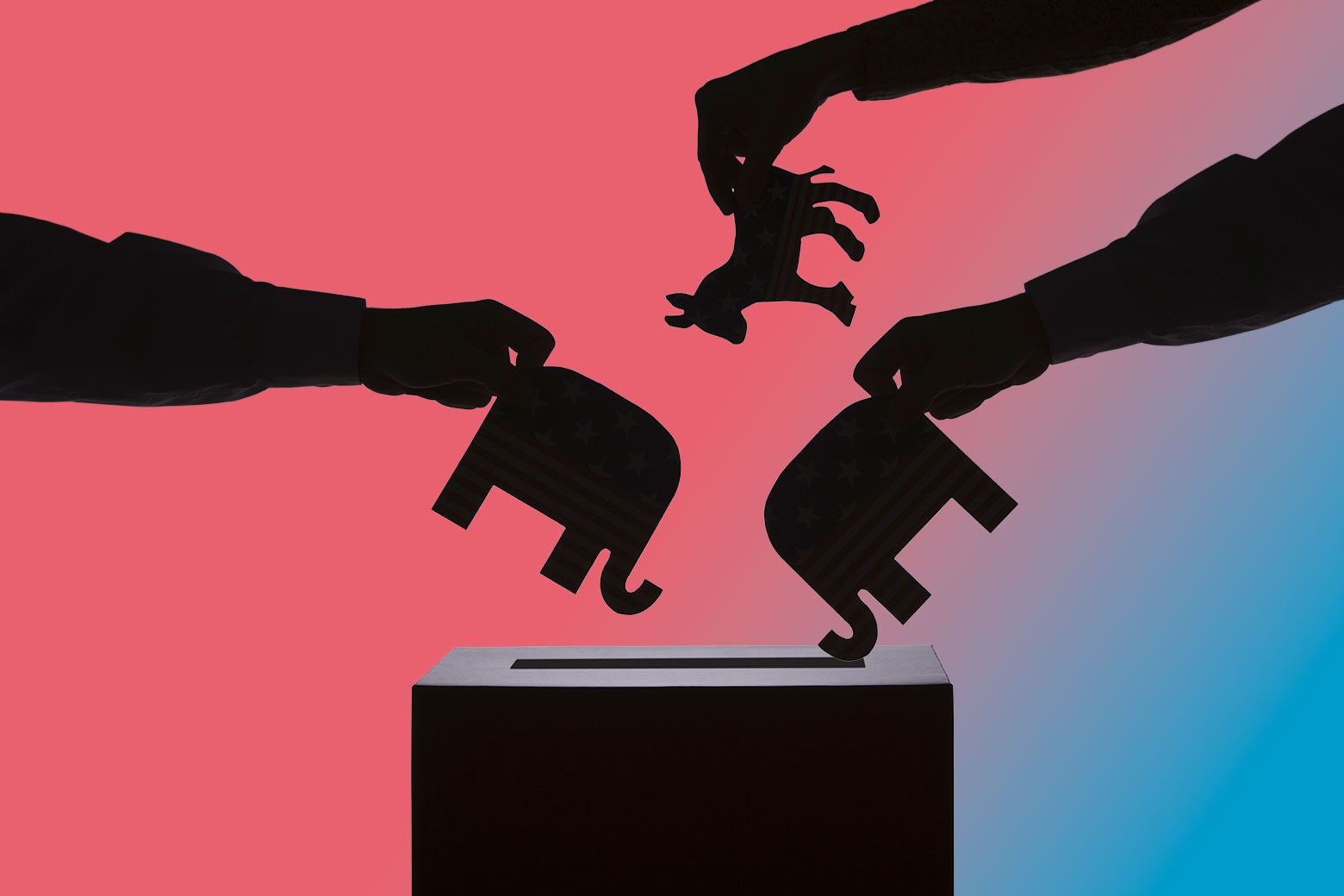Why Are Republicans Intent on Suppressing Their Own Voters?

 (min-width: 1024px)709px,
(min-width: 768px)620px,
calc(100vw - 30px)" width="1560">
(min-width: 1024px)709px,
(min-width: 768px)620px,
calc(100vw - 30px)" width="1560">Sign up for the Slatest to get the most insightful analysis, criticism, and advice out there, delivered to your inbox daily.
A young man shows up to register to vote at his county clerk 30 days before the presidential election. It's the last day to register. He's just moved to a new town for a job and has been working doubles at the factory for weeks on end. When he arrives at the clerk's office, he's informed he'll need papers to prove he's a citizen. But he's lost his birth certificate in the move, he's never had a passport, and they tell him his driver's license doesn't do the trick.
When I first became involved with voter protection for the Democrats, we always assumed that this vote, or any other being suppressed, was likely one of ours. Higher turnover benefited Democrats, and voters who would be hampered by burdensome paperwork were on our side. But in 2024, when I was head of voting protection for the Democratic National Committee, fighting for the voting rights of all Americans, I began to see many instances where Republican vote-suppression tactics became self-inflicted wounds.
Prior to 2016, when Republicans made voting tougher, it was redounded to their benefit. While these measures often have the intent and effect of making it harder for racial minorities to vote, in the modern era, they end up harming everyone who has fewer resources. For pre-2016 Republicans, this was a twofer: Making voting harder disproportionately hurt racial minorities and working-class whites, who also voted for Democrats.
However, since then, the electorate has shifted , and the Republicans have absorbed massive numbers of working-class white voters. These voters are still heavily impacted by Republican vote-suppression tactics, but the parties' shifting coalitions mean these attacks now significantly impact Republicans' own voters.
Now, Republicans are in the middle of a new push to make it harder to vote.
In March, President Trump issued an executive order that is intended to force people to submit documentary proof of citizenship when registering to vote via the federal voter registration form. Trump's order, as well as being of (at best) dubious legality, is something of a side show, as the vast majority of people use state forms while trying to register. (The national form is most commonly used by major national organizations in voting registration drives.)
But Republicans are looking to go much, much further. In April, the GOP-controlled House passed the SAVE Act, which is now before the Senate. That bill would force states to only accept registrations with documentary proof of citizenship, which does not include a driver's license in all but five states. Though, until recently, it had stalled in the Senate, in August conservative activists launched a nationwide push to get it over the finish line. In the end, all of this would mean more time rummaging through sock drawers to find your passport, more agitation trying to find a copier, and more hassle filling out paperwork in order to exercise your constitutional right to vote.
Unlike previous iterations of vote-suppression measures, this extra hassle will disproportionately hurt Republicans. Polling bears out that liberals are significantly more likely than conservatives to hold a passport. The measure also impacts married women because name changes complicated proving citizenship. Exit polling shows the majority of married women supported Trump in this last election, and married women who changed their names are probably more conservative than those who did not.
This self-sabotage by Republicans goes beyond the fight over proof of citizenship.
Because Democrats shifted mail voting during the pandemic, Republicans began attacking mail voting. These attacks sometimes lead to new policies restricting mail voting, but they also lead to Republican voters turning away from mail voting in droves. By 2024, Republicans perceived this as such a threat to their prospects that they were left in the awkward position of attacking mail voting as engendering widespread fraud—while also telling their voters to get out and vote by mail.
Similarly, lies about rigged voting machines have metastasized into Republicans pushing for hand-counts in their local jurisdictions. This has led to expensive , error-ridden processes in deep-red counties. Every vote lost or flipped due to error in an overwhelmingly Republican jurisdiction is overwhelmingly likely to be a Republican vote.
So, why are Republicans intent on pushing restrictions on voting—even as they hurt their own voters?
Each of these policies are intended to bolster Trump's lies about why he lost the election in 2020 or why he lost the popular vote in 2016. Republicans push the false claim that “millions of illegals” voted in 2016 and that voting machines and mail balloting were rigged in 2020. This serves three purposes. First, they're a pitch to the base, who now demand that something be done about these massive flaws in our system. Second, they are a play to Trump himself; by enacting these policies, Republicans are assuring Trump that they believe him and that he did win. Finally, they lay the groundwork for overturning the results of the next election. So, rather than seeking to suppress votes, the real goal seems to be engineering the argument for a Republican (or maybe Trump himself) to take the presidency in 2029 irrespective of vote totals in 2028.
There's a silver lining here. Right now, Republicans are too firmly in Trump's thrall to give up on voting restrictions, even as they damage their own prospects. But Trump will, someday, exit the scene. And when he does, and if the fever breaks, the reality that vote suppression is no longer to Republicans' benefit could give rise to a new, better dynamic: One in which neither party is actively trying to make it harder for people to exercise their right to vote.
 Sign up for Slate's evening newsletter.
Sign up for Slate's evening newsletter.




